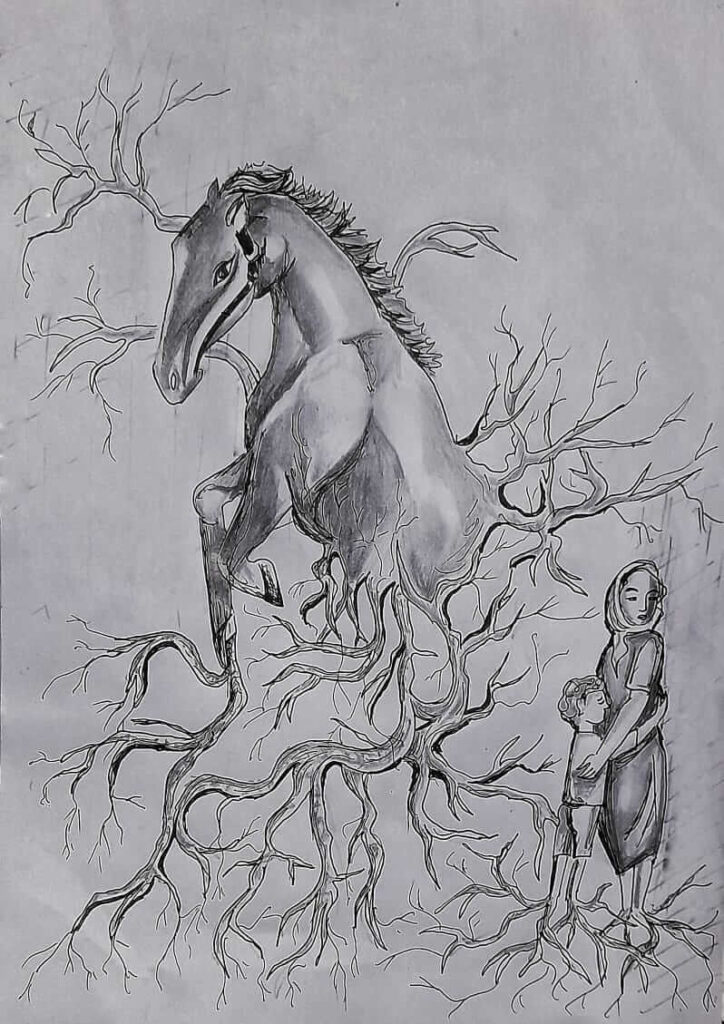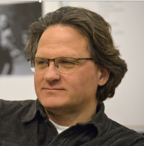The Kingdom
“A horse, a horse, my kingdom for a horse!”
—Shakespeare, Richard III
“…everything is very normal. The only thing is,
you will never know what they think. You will never know
what a Displaced Person thinks in the evening and in New York.
—Jonas Mekas, Lost, Lost, Lost
Artwork – Swagata Ghoshal
I pulled hard on the reins again:
the horse had stopped for the umpteenth time,
always eager to snatch the fecund leaves
along the park’s bridal path. But this time,
to my surprise, our guide castigated me.
The horse had stopped to shit, it seems.
Shit. What do I know about riding
a horse?
My mother was visiting us in Brooklyn,
and she had never ridden before, so here – cast
among plastic tumbleweeds and brick ravines –
would be her first time. She had ranged over
the cowboy plains of Colorado, Wyoming, Utah…
But no – my father feared horses. And nobody
had taken refugees for rides in German camps,
nor immigrants in Southie.
A Saturday circus act. We stood waiting
for mounts at the stables in Kensington.
Up and down. In and out. A dizzying
equine exchange. I grew antsy, unsettled, but
my mother took the wait with DP equanimity.
Every time I glanced her way – the same smile,
a child on Christmas Eve, the child she had been,
the core I would never know.
__
Close to Home
Let me march back, fading Homeric muse,
To the grove my father grew
Where blue jays squawked
And orioles trilled – where history’s
Erinyes were converted to the good
As evening dropped its lace upon the land.
That world was old, is always so,
Though immigrant forebears named it
New, whose dusky firs gave the feel
For father and me of tales told
Next to hearths in thatched cabins
An ocean apart, a century removed.
That ocean proved my parents’ lodestar:
It drew them close, a siren singing
So long to Winslow Homer’s woods
And their vascular anatomy of rivers.
Now, like feelers on the body politic’s skin,
My parents turn to where they were born.
Do displaced persons ever understand
What they miss when they stand
On the sand to gaze over Protean seas?
The Odyssey is a lie to such as these:
Penelope remarried long ago, happily
Enough. Maybe the dog holds true.
__
Before a Big Trip I Ask My Grandfather for Some Help
His arm, out-
stretched with a wrench,
muscles
straining,
unreels the wrinkled road
of eighty-four years.
Together we tackle my plates:
CA becomes blank space
as I prepare to leave
for the country he once fled
when the orders for exile
were passed down the line.
Then he looks at me –
our eyes meet – knowing
time has a way of going.
Another refugee, in NYC
tells the story of Eden’s
explosion –
its glowing embers
embedded in our dreams…
Removing the numbers,
nothing is erased.
We pass the embers like wrenches
hardly knowing the other
but knowing hard
how we flee to redeem
the dream-shards of Eden.
__
Drizzle
You look at the sun. Then you return home.
You can’t work. You’re impregnated with all that light.
– Jonas Mekas
Light, oh, barely light
– as in a cotton ball, or
through a wad of gauze –
a damp space, a drizzle
like the inside of a mouth,
like the outside of an eye
in whose reflection lies the one
you can’t have and never had,
the reflection of a reflection of you
where it’s still drizzling
fractals of faded light, fragments
of an ancient heirloom: a vessel
without function, a mute source
shattered and wrapped,
bandaged – bleeding light
under which you open your mouth
and drink like an immigrant
lost in the desert of a land
you will never reach.
__
Continent’s Edge
Humidity at the unawaited continent’s edge,
where dreams slowly begin to change,
and language, soon after, will yield.
It, too, cannot hold out for good.
– Tomas Venclova
I woke up next to Venclova
snoring contentedly by my side,
dazed, I gazed out the window
at blurred fields of rape and rye,
the stork nests now gone dry.
Two poets trapped between seats
on a bus, trapped between seas,
continents, lines. Words travel
less well between us than verse,
though that goes mostly just one way.
I take the seed and give it life.
Translator, porter, cabin boy:
I carry his baggage to another room.
We’ll be at the poetry festival soon.
Yet, what is this rheumy landscape
that our ancestors called home?
Who has translated me here, or am I
still on the fly, not like the firs
and poplars shooting by, but like
the bus and road that rolls, a spool
unwinding, a film unreeling—the pavement
hard as the end of an émigré poem.
__



























0 Comments